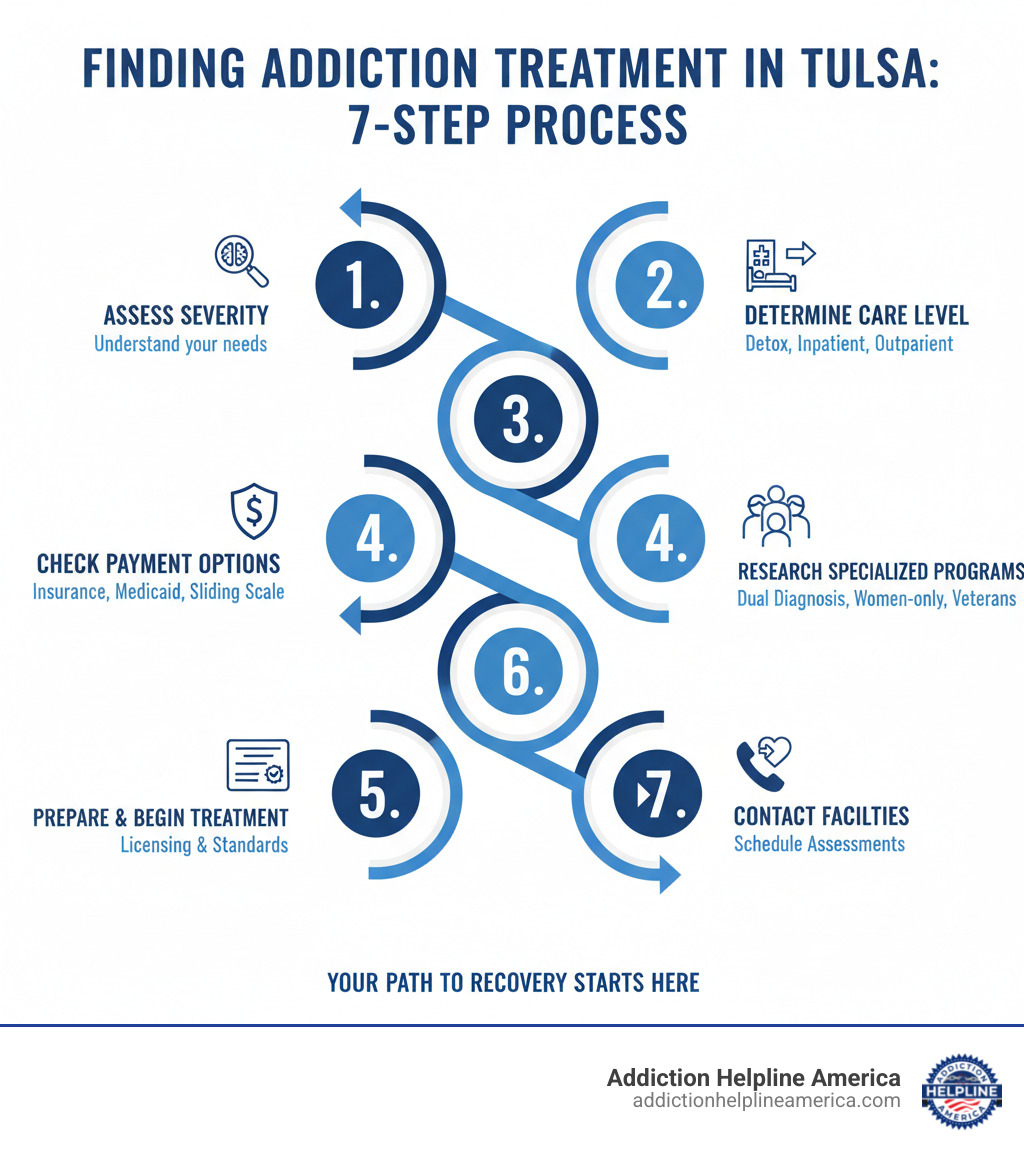
Why Finding the Right Rehab in Tulsa Could Save Your Life
Finding the right rehab in Tulsa can be a life-saving decision. With a wide range of treatment options available, from medical detox to specialized dual diagnosis care, help is within reach for those struggling with addiction.
Quick Guide to Tulsa Rehab Options:
- Medical Detox: Safe, supervised withdrawal management with 24/7 monitoring.
- Inpatient/Residential: 24-hour care in a structured environment, ideal for severe addiction.
- Outpatient (IOP/PHP): Flexible treatment while living at home, suitable for mild to moderate cases.
- Dual Diagnosis: Integrated treatment for addiction and co-occurring mental health conditions.
- Payment Options: 19 facilities accept Medicaid, 13 accept private insurance, and 14 accept cash/self-pay.
- Specialized Programs: Women-only, adolescent, veteran, and LGBTQ+ affirming care available.
The need for these services is urgent. Oklahoma saw a 418% increase in drug overdoses in 2022, and in Tulsa County, opiates were a leading cause of overdose hospitalizations. These statistics represent real people and families, but they also underscore a vital truth: recovery is possible.
Tulsa is home to dozens of treatment centers that use proven, evidence-based methods to help people overcome addiction. The challenge isn’t a lack of options—it’s knowing where to begin. This guide will break down the different levels of care, payment methods, and specialized programs to help you make an informed decision.
At Addiction Helpline America, we connect individuals with effective rehab in Tulsa and across the country. Our team offers confidential guidance to help you steer this process and take the first step toward a new life.
Understanding the Addiction Landscape in Tulsa
If you’re looking for rehab in Tulsa, it’s important to understand the local context. Oklahoma’s overdose crisis is severe, with a 418% increase in drug overdoses in 2022. Tulsa County has been hit hard, once ranking seventh-highest in the nation for overdose hospitalizations. Opiates and prescription anxiety medications are major contributors to this crisis.
Statistics show that while women in Tulsa County are more likely to be hospitalized for drug-related emergencies, men are twice as likely to die from an overdose. This highlights the different ways addiction can affect people.
Fortunately, legal protections are in place to help. Oklahoma’s Good Samaritan Law protects those who call 911 during an overdose from arrest for drug possession. Additionally, Mental Health Parity laws require insurance companies to cover substance use treatment similarly to physical health conditions, removing a significant barrier to care.
Types of Addiction Treatment Programs
Treatment for rehab in Tulsa is not one-size-fits-all. Programs are custom to specific needs:
- Alcohol Addiction Treatment: Often begins with medically supervised detox due to the dangers of withdrawal, followed by counseling and long-term support.
- Drug Addiction Treatment: Comprehensive programs addressing substances like cocaine, meth, and heroin through therapy and relapse prevention skills.
- Opioid Use Disorder Treatment: Many facilities offer Medication-Assisted Treatment (MAT), combining medications like buprenorphine with behavioral therapies to manage cravings and address brain chemistry.
- Prescription Drug Abuse Treatment: Focuses on safely tapering off medications while treating the underlying issues that led to dependency.
- Co-occurring Disorders (Dual Diagnosis): An integrated approach that treats addiction and mental health conditions like depression, anxiety, or PTSD simultaneously for the best chance at lasting recovery.
Effective programs use evidence-based therapies such as Cognitive Behavioral Therapy (CBT) and Dialectical Behavior Therapy (DBT), alongside family therapy and 12-Step facilitation. For more details, substance use treatment centers offer valuable resources.
Levels of Care Offered by Tulsa Rehab Centers
Addiction treatment is a continuum of care. The right level depends on your specific situation.
- Medical Detox: The first step for many, providing 24/7 medical supervision to safely manage withdrawal from substances like alcohol, opioids, or benzodiazepines.
- Inpatient/Residential Programs: The most intensive level, where you live at the facility for 30-90 days. It offers a structured, trigger-free environment with 24-hour support.
- Partial Hospitalization Programs (PHP): A step-down from inpatient care. You attend treatment for several hours a day, five days a week, but live at home or in a sober living facility.
- Intensive Outpatient Programs (IOP): A flexible option allowing you to work or attend school. It involves several hours of therapy, 3-5 days per week.
- Standard Outpatient Programs (OP): The least intensive option, with scheduled therapy sessions while you live at home. It’s ideal for mild addiction or as a final step in treatment.
- Sober Living Homes: Structured, substance-free residences that bridge the gap between treatment and independent living, providing peer support and accountability.
- Aftercare: Ongoing support after formal treatment ends, including therapy, support groups (AA/NA), and alumni programs to help maintain long-term recovery.
Inpatient vs. Outpatient: Which Rehab in Tulsa is Right for You?
Choosing between inpatient and outpatient treatment is a critical decision. The best rehab in Tulsa for you depends on the severity of your addiction, your home environment, and your personal responsibilities. There is no single “best” option, only what’s right for your situation.
Inpatient treatment involves living at a facility 24/7, fully immersed in a structured recovery program. Outpatient treatment allows you to live at home and attend therapy sessions several times a week, offering more flexibility.
Here’s how they compare:
| Feature | Inpatient/Residential Rehab | Outpatient Rehab (IOP/PHP) |
|---|---|---|
| Structure | Highly structured, 24/7 supervision, on-site living | Structured therapy sessions, but clients live at home |
| Intensity | High: immersive therapy, daily activities, constant support | Moderate to High: several hours of therapy per week |
| Cost | Generally higher due to accommodation, meals, and 24/7 care | Generally lower, as it doesn’t include living expenses |
| Duration | Short-term (28-30 days) to Long-term (60, 90+ days or longer) | Varies, can be weeks to months, often followed by less intensive care |
| Ideal Candidate | Severe addiction, co-occurring mental health issues, unstable home environment, need for medical detox, history of relapse | Mild to moderate addiction, stable home environment, work/school/family commitments, step-down from inpatient |
The Benefits of Inpatient Residential Treatment
Inpatient care provides a safe, controlled space to focus entirely on recovery. Key benefits include:
- 24/7 Medical Supervision: Crucial for safe detox and managing co-occurring health conditions.
- Structured Environment: Replaces chaos with a routine of therapy and healthy activities.
- Community Support: Living with peers who understand your struggle creates powerful, healing connections.
- Immersive Therapy: Without outside distractions, you can fully engage in counseling and skill-building.
- Removal from Triggers: A substance-free environment where you can heal without temptation.
Inpatient rehab in Tulsa is often best for severe addiction, an unstable home life, or if you’ve relapsed after trying outpatient care.
The Flexibility of Outpatient Treatment
Outpatient programs offer effective treatment without requiring you to put your life on hold. Key benefits include:
- Maintain Responsibilities: Continue working, attending school, or caring for family while in treatment.
- Live at Home: Stay connected to your support system and apply new skills in your daily life.
- Lower Cost: More affordable since it doesn’t include room and board.
- Real-World Practice: Learn to manage triggers in your actual environment with professional guidance.
Outpatient care is ideal for mild to moderate addiction, a stable living situation, and strong personal motivation. It’s also a great step-down from an inpatient program.
At Addiction Helpline America, we help you determine which level of care fits your unique needs. Our confidential assessments connect you with the right rehab in Tulsa for your situation.
Specialized Treatment Programs and Services in Tulsa
Effective addiction treatment recognizes that everyone’s journey is different. Many people seeking rehab in Tulsa need more than just standard substance use care; they need programs custom to their unique life circumstances.
Tulsa’s treatment community offers a variety of specialized programs, including dual diagnosis treatment, trauma-informed care, holistic therapies, and family involvement to rebuild relationships.
Finding a Specialized Rehab in Tulsa for Unique Needs
Specialized programs provide a more understanding and effective environment for recovery.
- Women-Only Programs: Centers like Resonance Center for Women offer a safe space to address gender-specific issues like trauma and societal pressures.
- Men-Only Programs: Facilities such as The HOW Foundation create an environment for men to tackle addiction alongside issues of masculinity and emotional vulnerability.
- Adolescents and Teens: YouthCare of Oklahoma provides age-appropriate treatment that accounts for peer pressure, family dynamics, and the developing brain.
- LGBTQ+ Affirming Care: Some centers offer culturally competent care, ensuring a safe and accepting space for LGBTQ+ individuals.
- Veterans Programs: The Eastern Oklahoma VA Health Care System – Tulsa BMC serves veterans and their families, addressing service-related trauma.
- Mothers with Children: Palmer Tulsa Women and Childrens Center allows mothers to keep their children with them during residential treatment, a life-changing approach that keeps families together.
- Culturally Specific Programs: Keetoowah Cherokee Treatment Services provides care that incorporates Native American traditional healing practices.
- Traumatic Brain Injury (TBI) Programs: Brookhaven Hospital specializes in treating the complex link between TBI, mental health, and addiction.
The Role of Mental Health in Addiction Recovery
Addiction rarely exists in a vacuum. It is often accompanied by depression, anxiety, or PTSD. This is known as a dual diagnosis or co-occurring disorder. Treating the substance use without addressing the underlying mental health issue is often ineffective.
Quality rehab in Tulsa provides integrated treatment, where the same team of professionals addresses both your addiction and mental health condition simultaneously. This approach gives you the best chance at lasting recovery by teaching healthy coping skills for conditions like anxiety and depression, often with the help of psychiatric services for medication management.
Oklahoma’s Mental Health Parity laws mandate that insurance companies cover mental health and substance use treatment comparably to medical care, making this comprehensive approach more accessible. For more information, you can explore scientific research on co-occurring disorders.
Addressing mental health is not an optional add-on; for many, it is the key to successful recovery. Addiction Helpline America can connect you with Tulsa facilities that provide the integrated care you need.
Paying for Treatment: Costs and Financial Options
The cost of rehab in Tulsa is a common concern, but treatment is more accessible than many people realize. There are numerous ways to manage the expense and get the help you need.
The average cost of addiction treatment in Tulsa is approximately $52,055, which is lower than both the state and national averages. However, this is just an average. The actual price depends on the level of care, length of stay, and specific services needed. Many programs cost significantly less, and some are even free.
The cost of treatment is an investment in your life, and there are many ways to make it affordable.
How to Pay for Your Rehab in Tulsa
At Addiction Helpline America, we help families steer their payment options. You likely have more choices than you think.
- Private Health Insurance: Thirteen facilities in Tulsa accept private insurance from major providers. Oklahoma’s Mental Health Parity laws ensure your addiction treatment is covered similarly to other medical care.
- Medicaid and Medicare: Medicaid is a vital resource for those with limited income, accepted at 19 rehab programs in Tulsa. Medicare is another option for eligible individuals.
- Other State and Federal Funding: Seven facilities accept other state-funded insurance. For military members, six rehabs accept TRICARE. Five facilities offer IHS/tribal/ITU funding for Native American individuals.
- Sliding Scale Fees: Many centers adjust their costs based on your income, making treatment more affordable.
- Free Options: Some organizations, like The H.O.W. Foundation, offer completely free residential programs for men, proving that cost doesn’t have to be a barrier.
- Self-Pay or Cash: Fourteen facilities in Tulsa accept direct payment. Some offer payment plans to spread the cost over time.
Don’t hesitate to ask facilities about scholarships or flexible payment arrangements. At Addiction Helpline America, we can help you explore these financial avenues and find a solution that works for you.
How to Prepare for Entering a Treatment Program
Deciding to enter a rehab in Tulsa is the most important step. Now it’s time to prepare logistically, mentally, and emotionally to set yourself up for success.
Taking the First Step: Acknowledging you need help is the foundation of recovery. If you are helping a loved one, approach them with compassion and support, encouraging them while setting healthy boundaries.
Practical Preparations:
- Confirm Admission Details: Know your admission date, time, and location. Arrange for transportation.
- Arrange for Responsibilities: Make sure children, pets, and other dependents are cared for during your stay.
- Notify Work or School: You can request medical leave without disclosing specific details. Your confidentiality is protected.
- Handle Financial and Legal Matters: Set up automatic bill payments or ask a trusted person for help. Consult with your attorney about any pending legal issues. Oklahoma’s Good Samaritan Law offers protection when seeking help for an overdose.
Emotional and Mental Readiness:
- Be Open-Minded: Approach treatment with a willingness to be honest and engage fully in the process.
- Set Realistic Expectations: Recovery is a journey, not a quick fix. The program provides the tools, but you must do the work.
- Identify Your Goals: Think about what you want to achieve, whether it’s sobriety, repaired relationships, or a healthier life. This will help you stay motivated.
- Lean on Your Support System: Let trusted friends and family know what you’re doing. Their encouragement is a powerful resource.
What to Pack:
Always check with your specific rehab in Tulsa for a detailed packing list. In general, you should bring:
- Comfortable clothing (layers are a good idea).
- Personal hygiene items (alcohol-free).
- A journal for reflection.
- Prescription medications in their original bottles.
Leave valuables and electronics at home to minimize distractions. This is your time to focus on healing. By preparing thoroughly, you give yourself the best chance at a transformative recovery experience.
Frequently Asked Questions about Addiction Treatment in Tulsa
When considering rehab in Tulsa, it’s normal to have questions. Here are answers to some of the most common inquiries we receive at Addiction Helpline America.
What is the typical duration of addiction treatment programs in Tulsa?
The length of treatment is personalized and depends on addiction severity, co-occurring conditions, and individual progress. However, there are some general timeframes:
- Short-term programs typically last 28-30 days. This is often enough time for detox and initial stabilization and is frequently covered by insurance.
- Long-term programs of 60 to 90 days or more are often recommended for lasting recovery. This extended time allows for deeper work on the root causes of addiction and the development of strong coping skills.
Many of the best rehab in Tulsa centers offer flexible program lengths. After primary treatment, aftercare is crucial for long-term success. This can include sober living, outpatient therapy, and support groups to help maintain sobriety for years to come.
What support services are available for families?
Addiction affects the entire family, and quality rehab in Tulsa centers offer services to help loved ones heal as well. Support for families often includes:
- Family Therapy: Sessions with a therapist to improve communication, rebuild trust, and heal relationships.
- Educational Workshops: Programs that teach families about the science of addiction, the recovery process, and how to be supportive without enabling.
- Family Support Groups: Groups like Al-Anon and Nar-Anon connect you with others who share similar experiences, providing comfort and understanding.
- Codependency Counseling: Specialized therapy to help family members establish healthier boundaries.
Some programs, like Palmer Tulsa Women and Childrens Center, even allow mothers to bring their children to treatment, promoting family healing. Supporting yourself is a necessary part of supporting your loved one.
How do I know if a treatment center is reputable?
Choosing a trustworthy rehab in Tulsa is essential. Here are key indicators of a quality program:
- Accreditation and Licensing: Look for accreditation from organizations like The Joint Commission (JCAHO) or CARF. All facilities must be licensed by the Oklahoma Department of Mental Health and Substance Abuse Services (ODMHSAS).
- Qualified Staff: The center should employ licensed medical doctors, psychiatrists, and certified addiction counselors. Don’t hesitate to ask about staff credentials.
- Evidence-Based Practices (EBPs): Reputable centers use therapies proven by scientific research on co-occurring disorders, such as CBT, DBT, and MAT.
- Personalized Treatment Plans: The program should be custom to your specific needs, not a one-size-fits-all approach.
- Continuum of Care: The facility should offer a full range of services, from detox to aftercare planning.
- Transparency: A good center is upfront about its programs, costs, and success rates, answering your questions without using pressure tactics.
At Addiction Helpline America, we vet our partner facilities and can connect you with reputable centers that meet these high standards.
Conclusion: Your Path to Recovery Starts Now
If you’ve read this guide, you’ve already taken a courageous step toward hope and healing. The journey through rehab in Tulsa can seem complex, but the most important takeaway is this: recovery is possible, and you don’t have to do it alone.
Tulsa offers a wealth of quality treatment options, from intensive inpatient programs to flexible outpatient care. With numerous facilities accepting Medicaid, offering sliding scale fees, or even providing free services, financial concerns should not be a barrier to getting help. The right path to recovery is the one that is right for you—a personalized plan that addresses your unique challenges and strengths.
We know this process can be overwhelming. That’s why Addiction Helpline America exists. Our team provides free, confidential guidance to help you understand your options, steer insurance, and find a treatment program that truly fits your needs.
You don’t need to have all the answers. You just need to be willing to take the next step.
Your path to recovery starts now. We’re here to walk alongside you and provide the support you need to make the best decision for yourself or your loved one.
Our helpline is 100%
free & confidential
If you or someone you care about is struggling with drug or alcohol addiction, we can help you explore your recovery options. Don’t face this challenge alone—seek support from us.
Programs
Resources
Will my insurance
cover addiction
treatment?
We're ready to help
Find the best
drug or alcohol treatment
center
Are you or a loved one struggling with addiction? Call today to speak to a treatment expert.
















